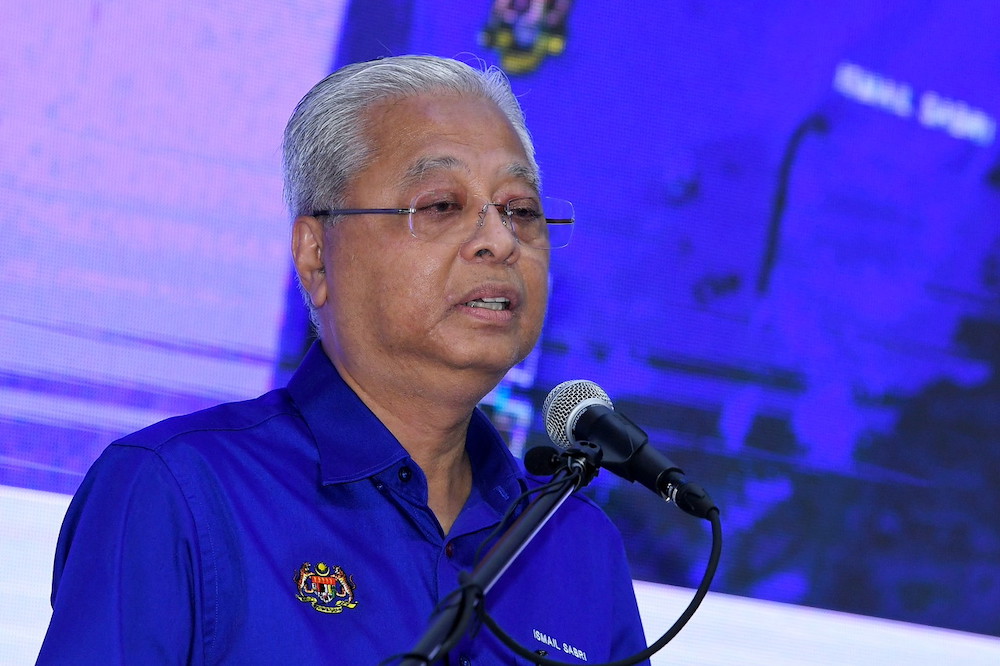KUALA LUMPUR, April 16 ― Umno’s decision to name its vice-president Datuk Seri Ismail Sabri Yaakob as its sole prime minister candidate is meant to contain factional tension within the party and avoid alienating voters wary of political instability, according to political analysts.
Ahmad Fauzi Abdul Hamid of Universiti Sains Malaysia suggested Datuk Seri Ahmad Zahid Hamidi wants to avoid any situation that could push Ismail Sabri to delay dissolving parliament. As prime minister, Ismail Sabri also holds tremendous influence that he could use to turn Umno against Zahid.
“It's a bait for Ismail Sabri to agree to a dissolution of Parliament as per the court cluster's prodding to go for the general election as soon as possible, when Umno is perhaps in its strongest position since the 14th general election,” he said.
“Umno is simply signalling to the public that it's okay with continuity and stability, which is what the present Agong had asked for from Ismail Sabri in August 2021.”
The “court cluster”, a derogatory term coined by political rivals, refers to Zahid and former prime minister Datuk Seri Najib Razak. Both of them are on trial for dozens of corruption charges, with Najib already convicted for misappropriating RM42 million of public monies through SRC International, a subsidiary of 1MDB.
Najib has since appealed. The former Umno president is still on trial for charges of embezzling billions of ringgit from 1MDB, a state investment fund he helped set up.
Ahmad Fauzi said as details from his court case are disclosed to the media, Zahid's clout in Umno will likely be undermined, making his candidacy as prime minister detrimental to Umno. Ismail, on the other hand, is still seen as a “clean” leader.
“Ismail isn't too popular either but at the moment his reputation is cleaner than Zahid and Najib. It's worthwhile for the court cluster to pin their hopes on Ismail in order to bring back Perikatan Nasional-supporting Malays back to Umno's fold.”
The Malay nationalist outfit, while on a resurgent form, is beset by talks of friction between camps eager to hold a general election as soon as this year and those who have rallied behind Ismail and demand that he stay longer as prime minister.
Party president Zahid, on trial for multiple charges of corruption, is said to lead the former camp. He has openly suggested that the party exploit the favourable mood that handed Umno two back-to-back supermajorities in the Melaka and Johor state elections.
On the ground, Umno leaders immediately interpreted Ismail Sabri’s nomination as invalidation of claims that the party is split.
Umno’s political bureau was likely aware of the allegations, according to analyst Awang Azman Awang Pawi, who said party leaders had likely wanted to mitigate the potential damage that could have been caused if rumours about the infighting is not allayed.
“This shows that when it reaches a certain level they have agreement and compromise to ensure that Umno wins big when the opposition is not in line with each other,” he said.
“If Umno is not united, then it will bear the big consequences of failing to capture Putrajaya as their ultimate goal.”
Some critics of the party have taken Ismail Sabri’s nomination as a sign of inconsistent leadership on the part of Zahid.
In the party’s General Assembly last month, Zahid said that Umno will not name its pick for prime minister following the recent Johor mentri besar fiasco, saying the final decision rests with the Yang di-Pertuan Agong.
When asked to reveal who would be Umno’s choice for prime minister, Zahid said that any of the party’s top five leaders could be a candidate: he himself, Datuk Seri Mohamad Hasan, Datuk Seri Ismail Sabri Yaakob, Datuk Seri Mohamed Khaled Nordin and Datuk Seri Mahdzir Khalid.
Azmi Hassan, a senior fellow at the Nusantara Academy for Strategic Research, disagreed that Ismail Sabri’s nomination now suggests that Umno intends to make him as the “poster boy” of its campaign.
“I think when Zahid said there will be no poster boy or a.k.a PM choice for Umno after Johor, it was meant for that particular time, in reference to the Johor incident,” he said.
Ultimately the move is meant to stop the internal bickering that could have surfaced when factions in Umno jostle for the prime minister’s post, he added.
“I see that Umno chose the easy way but by naming the PM, it will quiet down internal bickering between Umno in this case in terms of who is the PM of their choice,” Azmi said.
Umno supreme council member Datuk Seri Tajuddin Abdul Rahman was among those who poured cold water over Ismail Sabri’s chances to continue as prime minister if Barisan Nasional wins the upcoming general election.
Contradicting Umno’s stand, the former party election director cited the case of Machap state assemblyman Datuk Onn Hafiz Ghazi who was elected as Johor mentri besar ahead of Datuk Seri Hasni Mohammad, despite not holding the seniority in the state chapter.
During campaigning, Hasni was presented by the party as its choice for mentri besar, but in a twist of events, Johor Ruler Sultan Ibrahim Iskandar chose Onn Hafiz to lead the state instead.
This move initially drew ire from some factions within Umno, who felt Hasni should have been made mentri besar in return for his efforts in winning the state for the party.



















